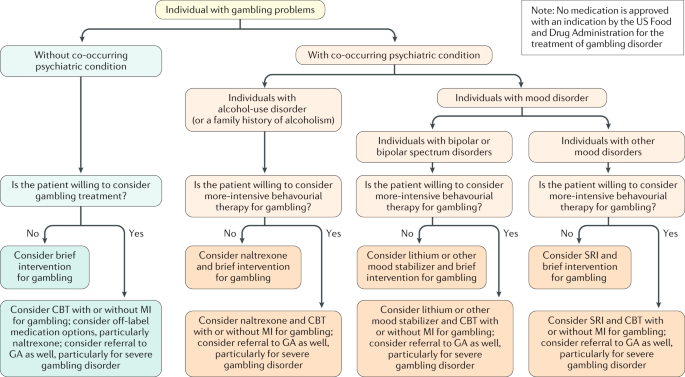Gambling Psychological Intervention
- What Is an Addiction Intervention?
Brief Interventions for Problem Gambling in Substance Use Disorder Treatment. Up to 20% of those in substance use disorder treatment also have a problem with gambling. This article compared three gambling treatments for individuals in two types of outpatient treatment programs – methadone maintenance and standard psychosocial treatment.
- Intervention descriptions were content analyzed to identify common and differentiating characteristics. A coder manual was developed and applied by three independent coders to identify the presence or absence of defined characteristics in 46 psychological and self-help gambling interventions.
- Future research evaluating interventions sequenced according to disorder severity or the functional relationship between the gambling behavior and comorbid symptomatology, identifying psychiatric disorders as moderators of the efficacy of problem gambling interventions, and evaluating interventions matched to client comorbidity could advance.
When gambling has progressed from purely social to problem gambling and on to pathological or compulsive gambling, there’s only one thing certain: the individual has a gambling addiction and needs help in order to overcome it. Addiction to gambling is similar in many respects to any other type of addiction – to alcohol, illicit drugs or prescription drugs used for nonmedical purposes for multiple co-occurring addictions – the addict continues with the addictive behavior despite all the negative physical, psychological, social and financial consequences. At the extreme, he or she gets to a point where they cannot stop gambling, they need to gamble, and they will risk everything in order to continue gambling. This process occurs over and over again until the addicted gambler ends up in jail, insane, or dead.
But there is hope for the compulsive gambler. The process is called gambling intervention.
What Is Gambling Intervention?
Similar to intervention for alcohol or drug addiction, gambling intervention is a process that brings together a professional interventionist and a “team” of family, friends and co-workers with the express purpose of confronting an individual about their compulsive gambling behavior and convincing him or her to seek treatment immediately. The intervention is conducted in a controlled and logical way, focusing attention on changing the addict’s behavior.

Gambling interventions work best when a professional interventionist facilitates the process, as the intervention itself can get very intense. Violent or explosive reactions on the part of the gambling addict may result, and are very difficult, if not impossible, for those present to handle on their own. That’s where the interventionist’s skills and expertise really come into play. He or she works to defuse the intense emotions and bring the situation back into control.
With the ultimate goal of getting the gambler to agree to go into treatment, all the arrangements for the treatment must be made prior to the actual day of the intervention. The reason for this is that a successful intervention concludes with the addict going off immediately into treatment – not the next day or next week, but that day. Once the gambler admits to having a problem and agrees to seek treatment, that’s the time to put the pre-planned admission into a gambling treatment program into action.

Expert interventionists know that you cannot convene an intervention and then not deliver on the promise to give hope to the problem gambler through a treatment program. Without a plan already set up, there’s nothing to prevent the addict from going right back to gambling.
What Happens In A Gambling Intervention?
Again, gambling intervention takes a page from interventions for drug and alcohol abuse. Since the premise behind the intervention is to make the addict aware of how much damage his or her actions have had on the various relationships – family, friends and co-workers – each individual participating in the intervention makes it clear how he or she has been personally affected by the gambler’s behavior. This often takes the form of reading from a letter the thoughts that the person has put together and practiced in a rehearsal the day before the actual intervention. Yes, there is a pre-intervention meeting of all the participants with the professional interventionist. During that meeting, the interventionist goes over the format and protocol for the intervention and each participant reads from his or her prepared letter in order to be prepared for the following day.
Besides explaining how the gambler’s behavior has affected them, each participant may also list specific incidents that highlight why the gambler needs treatment such as arrests, loss of a job, accidents, or family relationship breakdown. Often the family member, friend or workplace supervisor issue an ultimatum to the gambler. A boss may make returning to work conditional on the gambler’s receiving treatment. Family members or friends may make any future contact contingent on the gambler successfully completing treatment.
Make no mistake about it. Interventions are not easy to do. They’re emotionally exhausting, often eliciting very strong emotions on the part of the gambler and the participants. Team members must be prepared to convey their thoughts and any ultimatums in the kindest manner possible. Despite all the exhortations, screaming, denial and promises to quit from the gambler, the team members have to keep to their resolve. If the individual team members feel unable to deliver their ultimatum, the interventionist may deliver it for them.
Experts in interventions caution that young children should generally not be permitted to attend the session unless their contribution or presence is considered to be helpful to the gambling addict. This also applies to teenagers. As a practical matter, parents should be very careful about allowing any children to attend an intervention.
What Type Of Treatment Should Be Arranged?

This depends upon individual circumstances. The goal, remember, is to get the compulsive gambler into treatment. There are various treatment programs and help available to the gambling addict, including residential treatment, outpatient treatment, Gamblers Anonymous (GA), different therapy modalities or counseling or any combination of these.
Of all the treatment options, the one that works best is to remove the gambler from his or her environment, free of all the distractions and temptations and opportunity to gamble, and take them to a treatment center that specializes in treating compulsive gambling. Ideally this requires a facility that can provide a one-on-one approach that allows the gambler to dig deep into the root causes of his or her compulsion and to work toward learning new behaviors to overcome the addiction.
Since gambling affects many people beyond just the gambler, often the goal of the intervention is to get help for the family and concerned others as well. This may take the form of education, attendance at self-help groups, individual and/or group therapy or some other form of treatment that’s appropriate. Gam-Anon is one such group that offers support for family members and friends of compulsive gamblers.

After The Intervention
Once the compulsive gambler has gone off to treatment, participants in the intervention often feel an immense sense of relief. No, there’s no guarantee that the gambler will stay in treatment, or even fully commit to treatment, but there is one certainty: everyone’s addressed their concerns with the addict. There’s no more need for lies and deception. Now, everything’s out in the open relative to the individual’s addiction. Ultimatums may have been given that have some meaning to the addict.
- “If you don’t go into treatment, I will no longer have any contact with you.”
- “Either you accept treatment, or you no longer have a job.”
- “Although you’re my friend and I’d do anything for you, I won’t bail you out anymore. I’m not going to take your calls or see you if you don’t seek treatment.”

Family, friends and co-workers need to make plans for when the gambling addict returns from treatment. Just as an alcoholic cannot return to an environment where drinking occurs, or a drug addict can’t be around others who use drugs, the compulsive gambler can’t be exposed to gambling of any kind. This means no lotto, bingo, card playing – even for no wager – casinos, Internet gambling, sports or track betting.
Expect some difficult times, especially during periods of high stress or when something unexpected throws the recovering compulsive gambler for a loop. These may be financial, rejection by friends, family problems, physical or mental problems. The recovering compulsive gambler will continue to need your support during these situations. Encourage him or her to attend and participate in Gamblers Anonymous meetings. Make sure that you attend Gam-Anon or other support meetings yourself in order to better prepare you for how to deal with any crisis that occurs.
If Intervention Fails
It’s important to recognize that not everyone will be ready and able to accept that they need help. The compulsive gambler may not yet have hit bottom to the extent that he or she can even admit that they have a problem and need help. They may still be deluding themselves that they have everything under control, despite all the evidence to the contrary.
Examples Of Psychological Interventions
There isn’t much that you can do at this point. The compulsive gambler will sooner or later reach that lowest rung of hopelessness. Perhaps then they will accept an offer of help. Until that time, all anyone can do is to be ready to get the addict into treatment if and when the individual says yes.
List Of Psychological Interventions
How To Find A Gambling Treatment Facility
Resources are available to help you locate a treatment facility that can provide treatment for gambling addiction. One is the National Council on Problem Gambling, which also operates a 24-hour confidential hotline at 1-800-522-4700. In the state of California, there’s the California Council on Problem Gaming, and the California Department of Alcohol and Drug Programs, with information and links relative to problem gambling.
Get a referral to treatment facilities and then contact them to inquire about their gambling treatment programs. Many times, gambling addiction is a specialized track in the facility’s substance abuse treatment program. Make sure that the facility has nationally certified gambling counselors on its staff. If you are attempting to arrange a gambling intervention, be sure that the interventionist has expertise in conducting such interventions.
Above all, do gather as much information and educate yourself about all aspects of gambling addiction. This will prepare you for the hard work ahead, for the compulsive gambler and all those affected. The most important point to remember is that gambling addiction is treatable. You and your loved ones can be free of the negative consequences of compulsive gambling. There is hope – as long as the gambling addict seeks treatment.